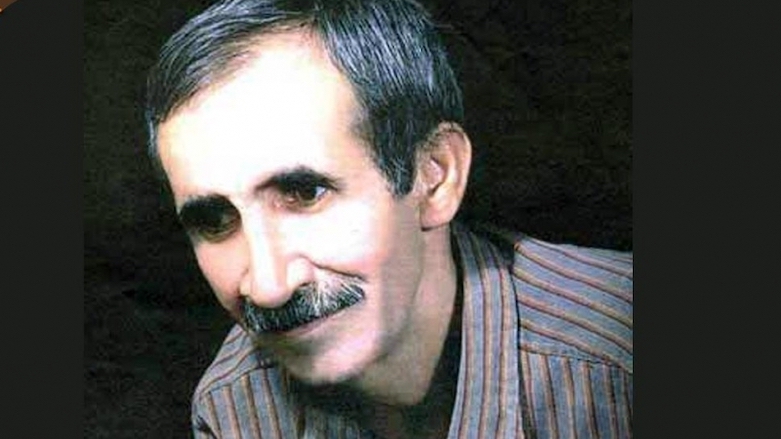Kurdish patriotic poet Jalal Malaksha dies aged 69
Kurdish patriotic poet Jalal Malaksha died of cancer on Saturday night at the age of 69 in Sanandaj (Sine), Iranian Kurdistan.

ERBIL (Kurdistan 24) – Kurdish patriotic poet Jalal Malaksha died of cancer on Saturday night at the age of 69 in Sanandaj (Sine), Iranian Kurdistan.
In the aftermath of his death, tributes poured in from Kurds around the world via social media.
“He was the voice of resistance and tragedy in the history of Kurdistan. Poetry alongside music are the most important languages in Kurdish culture to resist,” Iranian Kurdish journalist Behrouz Boochani said in a Twitter post.
Jalal Malekshah, a Kurdish poet died age 79 last night. He was the voice of resistance and tragedy in history of Kurdistan. Poetry alongside music are the most important languages in Kurdish culture to resist. #جلال_ملکشاه pic.twitter.com/Gywz1ynShX
— Behrouz Boochani (@BehrouzBoochani) November 1, 2020
“As a national poet, Jalal Malaksha had a special place in the hearts of the Kurds,” Kurdish engineering student Narin Piran told Kurdistan 24. “In his poems, he expressed his love for his homeland Kurdistan. He never bowed to the oppressors and said, ‘I have lived with honor and will die with a clear conscience.’”
Dr. Haidar Khezri, an Assistant Professor at the Department of Modern Languages and Literatures at the University of Central Florida in the United States, told Kurdistan 24 that Malaksha was imprisoned several times before and after the 1979 Islamic Revolution.
“At least three sorts of imprisonment characterize Malaksha’s personal and academic life. The first one is the multiple incarcerations he endured both before and after the 1979 Islamic Revolution of Iran. Of this, he said, ‘There was no prison left in Iran that I have not written on its walls,’” Khezri stated.
“The second imprisonment is a historical one,” he continued. “Pre-twentieth-century Safavid-Qajarian-Ottoman and post-twentieth-century European colonialisms have collaboratively made Kurdistan into an ‘International Colony,’ to borrow Besikci’s apt term.”
“Similar to Peshmarga, Kolbars, and Sufi dervishes of the Qaderi, each and every poem written by Malaksha challenged the colonial borders of Kurdistan,” he added. “For instance, two of his most famous poems, ‘Tasa’ and ‘Kavay Korm,’ manifest this aspect of Malaksha’s vision.”
“The third imprisonment is related to Malaksha as a poet,” Khezri said. “Not only the constraining imprisonment of poetic forms, but also the limitation and restriction of writing and publishing poetry in his native Kurdish language, a pattern of impediments he faced throughout his life. Malaksha wished to [be] reborn as a rustic ‘farmer’ wielding a poetic spirit.”
Malaksha also remained sensitively attuned to the situation of the Kurds in other parts of the Greater Kurdistan.
In 2014, when the so-called Islamic State attacked the Kurdish city of Kobani in Syria, Malaksha published a poem in solidarity. As a result of this poem, Iranian security forces once more interrogated him.
During the genocide of the Yezidis by the Islamic State in Shingal in August 2014, he wrote a poem, “I Do Not Pray to Your God,” against the terror group’s misuse of religious devotion and as an expression of unity with the Yezidis.
Dr. Tyler Fisher, an Associate Professor at the University of Central Florida’s Department of Modern Languages and Literatures, has collaborated in translations of Malaksha’s verses and has worked on preserving Yezidi folklore over the past decade.
“Malaksha’s poetic act of solidarity, standing alongside the Yezidis, came at a historic juncture,” Dr. Fisher told Kurdistan 24. “His poem rejects the violence and extremism of the Islamic State in favor of a moderate vision that depicts a religious pluralism in Kurdistan’s natural landscape: ‘sacred ablutions in a cold mountain spring/and a prayer rug of petals.’”
Regarding the connection Malaksha’s poetry has with the reality of the Kurdish people in Iran, Dr. Khezri added that Malaksha’s poem “On Death Row” offers a microcosm of his entire legacy, and gives the most accurate and frank picture of the situation of the Kurds in Iranian Kurdistan.
Khezri believes this poem encapsulates the 1988 executions of Iranian political prisoners, the Chain Murders of Iran (1988-1998), and the executions in response to the post-2009 Iranian Green Movement. Kurds constitute the majority of victims of these executions during three crucial periods in Iran’s modern history.
During Malaksha’s funeral on Sunday, mourners shouted nationalist slogans and sang the Kurdish national anthem Ey Reqîb (Oh enemy).
Kurds sing Kurdish anthem Ey Reqîb (Hey Enemy) at funeral of Kurdish patriotic poet Jalal Malakshah from Sine, Rojhlat pic.twitter.com/Jq42J4Tm7F
— Wladimir (@vvanwilgenburg) November 3, 2020
“Unfortunately, the prominent poet and capable writer of a nation lost his life,” Safeen Dizayee, Head of the Foreign Relations Department at the Kurdistan Regional Government (KRG), wrote on Twitter.
زۆر بهداخهوه شاعیر و نووسەری دیار و بەتوانای گهلهكهمان (جەلالی مەلەکشا) بۆ دواجار ماڵئاوایی لێكردین و گیانی سپارد. پرسه و سهرهخۆشی له بنەماڵە بەڕێزەکەی و تهواوی ئهدیب دۆستان و نووسهران دهكهم. خوای مهزن گیانی به بهههشتی بهرین شاد بكات.
— Safeen Dizayee (@SafeenDizayee) November 1, 2020
انا لله وانا اليه راجعون pic.twitter.com/DiY9HxTE0t
The President of the Kurdistan Democratic Party (KDP), Masoud Barzani, in a condolence message, described Malaksha as a “patriotic writer, and poet, whose finger has been seen clearly in improving the literature and culture of Kurdistan.”
“My condolences to Jalal Maleksha’s family, and to all the writers and intellectuals of Sine and all [of] Kurdistan.”
Editing by Karzan Sulaivany
